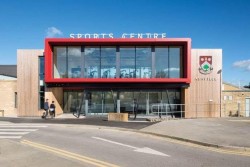Here Paul Lang, Caledonian's CEO, looks at how offsite construction can help alleviate the shortage of school places, through shorter build schedules that minimise disruption to the students, campus and the local community.
Research recently conducted by a leading procurement specialist has revealed that an additional 435,646 pupils will be joining the UK's secondary school system in 2020, requiring over 14,500 additional secondary classrooms, each with 30 pupils, across the country. These 14,522 secondary school classrooms would need to be built over the next three years in order to cope with the increase in pupil numbers. In practical terms, this would equate to over 400 brand-new 1050-pupil secondary schools across the country.
Also, according to a separate report published by a major UK political party in 2017, just over one in five existing schools (21%) were over capacity across all year groups, and a further 20% were at capacity, making it clear that classroom overcrowding is becoming a bigger and bigger issue.
LEAs, therefore, need to extend existing establishments and invest in new facilities quickly to accommodate the increasing number of pupils. However, with a shortage of funds and resources available, new schools, and supporting campus buildings, must be cost-effective and built within short timescales. They also need to be of guaranteed high quality and low maintenance so that the LEA achieves value for money.
SMART construction
Compared to building using traditional methods; the education sector benefits enormously from offsite construction. More than 80 to 90% of the work can be completed in a factory, like our Newark-based facility, a quality controlled environment, unaffected by the weather or skills shortages on site. This significantly reduces the likelihood of delays to the project. In addition, offsite offers minimal disruption to the surrounding community by ensuring a rapid build and cutting down significantly reducing deliveries and activities to site.
Suitable to more than just schools, offsite construction delivers a raft of benefits in all sectors - residential, hotels, communal buildings, further and higher education, retail, commercial outlets and health, amongst others. Offering a full turnkey solution, we design and build to an exacting specification, offer a wide range of finishes and roofing options, and produce a design that fits seamlessly alongside any existing structures.
Manufacturing offsite, in itself, creates a safer workplace, being a more controlled environment, requiring less need for working at height. Modular is also more economical and kinder to the environment, with a dramatic reduction in waste and the consumption of materials such as cement, compared to traditional build methods.
It is for these reasons that the education sector is starting to recognise and embrace the benefits of offsite construction. So much so that we have recently been awarded a position on the £50m Education and Skills Funding Agency Framework to act as lead designer and principal contractor for new schools, academies and other educational facilities.
Outside of the classroom
We have worked on several projects within the education sector; including a £13m turnkey contract to build an extension of the existing boarding facilities at ACS Cobham International School, which was designed by Broadway Malyan. We were responsible for the manufacture and construction of the modular components of the new facility, which provided an additional 113 bed spaces, all in premium single and double rooms. It also incorporated supervisor accommodation, study areas and common rooms to complete an eye-catching four-storey building.
Another great example of an educational establishment that has fully embraced the benefits of offsite construction outside of the classroom is Ashville College in Harrogate. We developed a striking new £2.5m sports complex, featuring a projecting entrance pod, and a large, open area gymnasium space, with full-height windows to maximise natural light. This was a challenging project because the new sports complex was positioned between two existing buildings, and within the school campus, thus requiring a very precise footprint. As a result, the accuracy of design and installation were key factors taken into account before the college chose an offsite solution. There was also a very strict timescale amongst other contractual obligations, all of which were achieved on time, within budget and before the new school term began in September.
Complete school built offsite
The design and build of Farnborough Academy in Nottinghamshire was probably one of the biggest offsite projects that we have completed within the education sector. The 7005m² academy, effectively a whole new school with full campus facilities, houses more than 1000 pupils. The project was on a very demanding timescale and, as it needed to be delivered alongside an active secondary school, offsite construction was identified as the most effective method of meeting the requirements.
Up to 80% of the building was manufactured in our facility, before being delivered to site for rapid assembly, meeting the demands of a tight 42-week programme. Overall, the offsite solution specified achieved a time saving of six months compared to a traditional build and included the manufacture of 141 modules, on-site construction and internal fit-outs.
Preferred option
This and some of our other recent projects are testament to the fact that offsite construction is also proving a popular choice for entire schools and campus facilities outside of the classroom. With many educational establishments throughout the UK opting for modular solutions for communal, sports and leisure facilities.
We believe that offsite construction will continue to be embraced by local authorities and education bodies for the foreseeable future. The Government has already stated in its November budget statement that it will favour offsite manufacturing on all publicly funded construction projects from 2019, and that augurs well for tackling the ongoing problem of school places.
Original link - PSBJ









